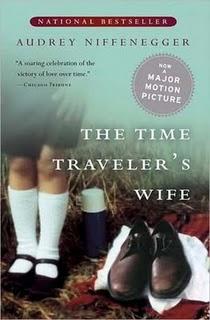The Time Traveler’s Wife

When I started reading The Time Traveler's Wife, I was hooked right away. I don't read fiction very often, so it was a refreshing change of pace, and the concept was cool: a man with a genetic condition that makes him time travel, but he can't control it.
The narration in the novel switches back and forth between the two main characters, Clare and Henry. We jump through time to follow their love story, which starts when Clare is only six, and see it develop as Clare grows up. Each time the narration switches, we are told who is speaking, where they are in time, and how old they are.
There are a lot of things I liked about this novel. I liked the relationship between the main characters, and the way we see that story unfold. Their love of food, their quirks, their shared interest in punk music—it all made me feel like the characters were real people, like I knew them. Their flaws, the secrets they keep from each other, and the way we learn the truth made me connect with the characters throughout most of the story.
I also liked trying to keep up with the dates and the ages of all the characters, and matching up events we learned about in passing with what we see happening. The many parent-child relationships in the novel were also true-to-life, and I appreciated the range of experiences. All of these things kept me very happy during the first three quarters of the book. After that point, the story started to drag a bit.
The reader is well past the point of climax by the time threads in the story start looping together. One already knows everything that is going to happen, and suddenly has to wait another 100 pages or so before it actually happens. I found myself growing impatient and just wanted to finish already.
This was also around the time that I stopped liking Clare. Her obsession with having a child started to irritate me, particularly when she says that adoption is fake and that it's like pretending. But what really bothered me was how the story ended. Even though Clare spends most of the book waiting around for Henry, I still imagined her as a strong woman with her own will and an independent streak. By the last few chapters, it's as if her life is meaningless without that relationship. She falls apart and we never see her put herself back together, which is what I kept hoping would happen.
I can certainly see this book's appeal as a great love story between two people who can't live without one another. Perhaps I left my feminist lens on for too long, though, because that wasn't enough for me. Overall, though, I enjoyed the story and did get swept away for a bit into a world where time travel was possible and a love was meant to be.
The Time Traveler's Wife is by far one of my favorite books. To disect it from a specific perspective (feminist) inevitably lends itself to changing my view of the book, overall.
Nevertheless, to analyze Clare from a feminist perspective is not too difficult. She is, without a doubt in my mind, a strong-willed woman. Sure, looking at it in black and white - she found ways to occupy her time when waiting for Henry to re-appear, she made somewhat of a life of her own. But beyond that, she symbolizes so much more. She represents stability in Henry's life (what could be a more female role); she is ultimately an eternal optimist; she represents strength and vulernability all in one; she gives all of her love to this unreliable man but she's honest with herself in knowing that he is who she loves and has dedicated her life to fulfilling that passion. I admire her dedication (despite a couple slip-ups) and think that a lot of women today have this problem in a relationship. Clare embraces and accepts reality and optimistically at that.
I read this novel a year ago and absolutely loved it. I recall her obsession with having a biological child, and sort of just chalked it up to one of those things that I, a woman who has absolutely no interest in being pregnant, just can't understand. (And I have been told by my father that if I adopt children, they wouldn't be the same as his having "real" grandchildren.) What I really liked about Clare (from what I can recall from last summer) was that she loved Henry and was always happy to see him return, but had things to do on her own when he was away. I think she is devastated by the idea of life without Henry, but that seems natural for a woman who has known and loved her husband since she was six.
SPOILER I think what really showed me that she had to be a strong independent woman was the fact that we know she lived into her old age - as devastated as Henry's death may have been, she had to be strong enough to carry on caring for her child and herself to continue living. Even if it was to see Henry one last time in this life.